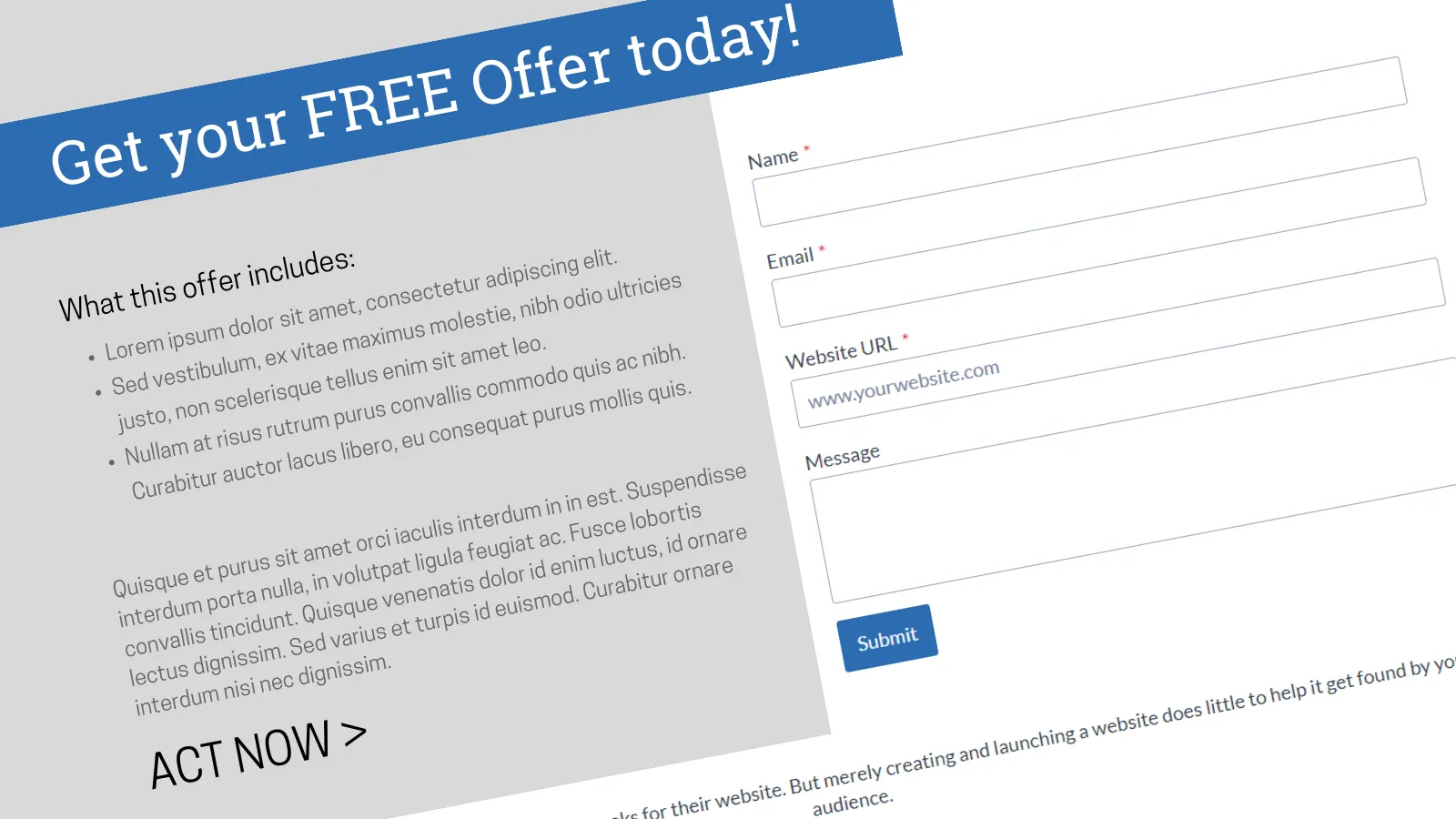Landing Pages vs. Home Pages: Which Drives More Leads and Sales?
In the ever-evolving landscape of online marketing, the battle for user engagement, leads, and sales rages on. As a content creator or business owner, you understand that your website’s success hinges on its ability to capture the attention of visitors and convert them into loyal customers.
Why should it matter what initial website page that your prospects lands on – whether its a ‘landing page’ or the website’s homepage?
In today’s fast-paced digital world, you have only a matter of seconds to make a lasting impression. The message you convey must align seamlessly with the source that brought the visitor to your site, whether it’s a social media post, a video, an email, or an advertisement. This alignment is crucial because it sets the stage for a visitor’s entire experience.
Consider these key points as we dive into the discussion of the landing page vs home page:
First Impressions Matter: Visitors form snap judgments about your website within seconds of arrival. The aesthetics, loading speed, and overall design play a pivotal role in determining whether they stay or leave.
Alignment with Source: When a visitor clicks on a link from social media, an email campaign, or an online ad, they expect to find information relevant to what piqued their interest. Any disconnect can result in a bounce.
The Battle of Conversions: Ultimately, the success of your online endeavors boils down to conversions. Whether you aim to capture leads, sell products, or raise brand awareness, you must choose the right strategy that aligns with your goals.
In this article, we will unravel the mysteries of landing pages vs. home pages. We’ll explore their unique roles in the digital ecosystem and dissect the critical factors that determine their effectiveness. By the end, you’ll have the insights you need to make informed decisions and craft web experiences that captivate, convert, and drive success in the competitive online arena. So, let’s dive into the showdown between landing pages and home pages and discover which one reigns supreme in the quest for leads and sales.
What is a Landing Page?
Before we delve into the comparison of landing pages and home pages, let’s first define what a landing page is and understand its fundamental elements.
What is a Landing Page? A landing page is a standalone web page designed with a specific goal in mind, such as capturing leads, promoting a product, or encouraging a particular action. Unlike a website’s home page, which serves as a general entry point, a landing page is hyper-focused on a single objective.

Understanding these key elements is vital because they form the foundation of an effective landing page. In the subsequent sections, we will explore how these elements contribute to the success of landing pages and compare them to the broader scope of home pages.
How Does a Landing Page Differ from a Website’s Home Page?
Now that we have a grasp of what a landing page is and its key elements, let’s explore the critical distinctions between a landing page and a website’s home page. While both serve as entry points to your online presence, their purposes, designs, and functions diverge significantly.
| Feature | Landing Page | Home Page |
| Singular Focus vs. Multi-Purpose | Landing pages are designed for a single, specific purpose. | In contrast, a website’s home page serves as the central hub of your online presence. |
| Message and Alignment | The message on a landing page must align seamlessly with the source that brought the visitor there. | Home pages have a more generalized message and are often designed to cater to a broader audience. |
| Navigation and Distractions | To maximize conversions, landing pages typically minimize distractions. | Home pages provide more extensive navigation options to help visitors explore various aspects of your website. |
| Content Depth | Content on landing pages is concise and laser-focused. | Home pages often contain more extensive content, including introductions to your brand, featured products or services, blog posts, and additional information about your company’s history, mission, and values. |
Understanding these fundamental differences is essential for making informed decisions about which type of page to use in various scenarios. In the following sections, we will delve deeper into the strengths and weaknesses of both landing pages and home pages to help you determine which is the right choice for your specific goals and audience.
Conversion Rates and Lead Generation
In the realm of digital marketing, conversion rates and lead generation are key performance indicators that determine the success of your online efforts. Let’s take a closer look at how landing pages and home pages stack up in this critical aspect, and where possible, we’ll provide specific ROI comparisons supported by credible sources.
Conversion Rates on Landing Pages:
Landing pages are renowned for their ability to drive higher conversion rates compared to home pages. Here’s why:
- Focused Messaging: Landing pages present a clear and concise message tailored to a specific audience and goal. This laser-focused approach minimizes distractions and keeps visitors on track to complete the desired action.
- Alignment with Marketing Campaigns: Landing pages are often created in conjunction with marketing campaigns. When a visitor arrives at a landing page through a campaign-specific link, they encounter content directly related to what prompted their interest. This alignment significantly increases the likelihood of conversion.
- A/B Testing: Effective landing pages undergo continuous A/B testing to optimize elements like headlines, CTA buttons, and form fields. These tests lead to incremental improvements in conversion rates over time.
According to a report by Unbounce, a leading landing page platform, the average conversion rate for landing pages across various industries is around 9.7%.
However, the top 25% of landing pages achieve conversion rates of 25% or higher, showcasing the potential for remarkable ROI when well-optimized.
Conversion Rates on Home Pages:
In contrast, home pages serve a broader purpose and may not be as effective at driving immediate conversions. Here are a few reasons why:
- Diverse Audience: Home pages cater to a wide range of visitors with varying interests and intentions. Consequently, it’s challenging to create a one-size-fits-all approach that resonates deeply enough to drive immediate conversions.
- Information Overload: Home pages often contain extensive information about a brand, products, services, and more. While this serves as a comprehensive introduction, it can overwhelm visitors and detract from conversion-focused actions.
- Navigation Complexity: Home pages typically offer more navigation options, which can lead visitors down various paths rather than guiding them toward a specific action.
Research from MarketingSherpa found that landing pages have an average conversion rate of 24.03%, while the average conversion rate for home pages is significantly lower at 1.68%.
ROI Comparison – Landing Pages vs. Home Pages
The ROI comparison between landing pages and home pages heavily favors landing pages when it comes to specific campaigns with clear conversion goals. The focused, campaign-specific nature of landing pages often leads to higher conversion rates, resulting in a more favorable return on investment.
However, it’s important to note that home pages still play a vital role in overall brand awareness and providing a central point of access to various sections of your website. The key is to strike a balance and use each type of page strategically based on your specific objectives.
In the next section, we’ll explore the impact of landing pages and home pages on SEO and traffic generation, shedding light on their differing contributions to online visibility and engagement.
Choosing the Right Approach for Your Next Campaign
Choosing between a landing page and a home page is a critical decision that hinges on your specific objectives, audience, and marketing strategies. In this section, we will provide guidance to help you make an informed choice that aligns with your goals and maximizes your online success.
1. Define Your Objectives:
Begin by clearly defining your objectives. What do you want to achieve with the web page in question? Are you looking to:
- Capture leads for a new product or service?
- Promote a limited-time offer or discount?
- Encourage event sign-ups?
- Showcase your brand and provide an entry point to your website?
Understanding your primary goal is the foundation upon which you can make the right choice.
2. Consider Your Audience:
Your target audience plays a pivotal role in your decision-making process. Consider their needs, expectations, and preferences:
- If you’re targeting a specific audience with a focused campaign, a landing page designed explicitly for that campaign may be the best choice. It ensures alignment with their interests.
- If your audience is more diverse and seeks general information about your brand, products, or services, a home page provides a comprehensive introduction.
3. Analyze Your Marketing Campaigns:
Examine your marketing campaigns and their associated messaging. Landing pages work exceptionally well when your campaigns have specific calls to action, such as “Sign Up Now” or “Claim Your Discount.” Ensure that your landing page aligns with the message and promise made in your campaign materials.
4. Assess Your Website Structure:
Consider your website’s overall structure. If you already have a well-organized website with clear navigation and a user-friendly layout, using a landing page for specific campaigns can be a seamless addition. Home pages, on the other hand, serve as the central hub of your website and connect visitors to various sections.
5. Balance Landing Pages and Home Pages:
In many cases, the choice between a landing page and a home page is not an either-or decision. You can strategically balance both:
- Use landing pages for specific campaigns, promotions, or lead generation efforts. These pages can be temporary and closely tied to your marketing initiatives.
- Leverage your home page to provide a welcoming and informative entry point to your entire website. It should offer an overview of your brand and provide easy access to different sections.
6. Test and Optimize:
Regardless of your choice, implement a robust testing and optimization strategy. Regularly monitor the performance of your landing pages and home pages using analytics tools. Conduct A/B tests to refine elements and improve conversion rates.
7. Seek Professional Advice:
If you’re unsure about the best approach for your specific situation, consider consulting with a digital marketing expert or web designer. They can provide valuable insights and recommendations tailored to your unique needs.

Convert More of Your Website Visitors into New Customers
In conclusion, the decision between using a landing page or a home page depends on your objectives, audience, and marketing strategy. By carefully considering these factors and conducting ongoing analysis and optimization, you can choose the right approach to maximize the impact of your online presence and achieve your desired outcomes.








